Chad, officially the Republic of Chad, is a landlocked country in Central Africa. It borders Libya to the north, Sudan to the east, the Central African Republic to the south, Cameroon and Nigeria to the southwest, and Niger to the west. Due to its distance from the sea and its largely desert climate, the country is sometimes referred to as the "Dead Heart of Africa".
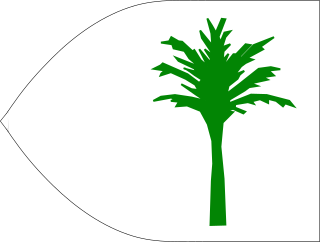
The Kanem–Bornu Empire existed in areas which are now part of Nigeria, Niger, Cameroon, Libya and Chad. It was known to the Arabian geographers as the Kanem Empire from the 8th century AD onward and lasted as the independent kingdom of Bornu until 1900.

Émile Gentil was a French colonial administrator, naval officer, and military leader. He is best known for heading two military missions to conquer and consolidate territories north from modern Gabon to Chad.
Zubayr is an Arabic masculine name and a surname from the root Z-B-R, meaning 'strong' or 'brave'. People with that name include:
Faḍl ibn ʿAbbās was a brother of Abd Allah ibn Abbas and was a cousin of the Islamic prophet Muhammad.

Kousséri, founded and known as Mser in the indigenous Mser language, is a city in Far North Province, Cameroon. It is the capital of the Logone-et-Chari department. It is a market town, and its population has recently been swollen by refugees from Chad. It had a population of 89,123 at the 2005 Census. The majority of the population are Shuwa Arabs with Chadian Arabic used as the lingua franca.

Chad was a part of the French colonial empire from 1900 to 1960. Colonial rule under the French began in 1900 when the Military Territory of Chad was established. From 1905, Chad was linked to the federation of French colonial possessions in Middle Africa, known from 1910 under the name of French Equatorial Africa. Chad passed in 1920 to French civilian administration, but suffered from chronic neglect.

Rabih az-Zubayr ibn Fadl Allah or Rabih Fadlallah, usually known as Rabah in French, was a Sudanese warlord and slave trader who established a powerful empire east of Lake Chad, in today's Chad.
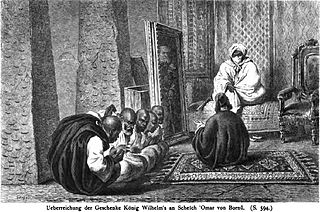
Umar I ibn Muhammad al-Amin or Umar of Borno was Shehu (Sheik) of the Kanem-Bornu Empire and son of Muhammad al-Amin al-Kanemi.
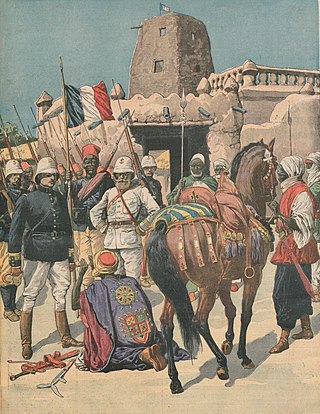
The Wadai War, also known as the Ouaddai War, was waged by France and its African allies against the Wadai Empire and its allies from 1906 to 1912. Located in what today would be eastern Chad and western Sudan, Wadai fiercely resisted the French invasion. Regardless, much of Wadai including its capital Abéché fell to the invaders in 1909, forcing the empire's ruler Dud Murra to continue his resistance from outlying provinces and allied states. He managed to gain the support of the Sultanate of Darfur and Dar Masalit, and used these areas as rear bases during his attempts to oust the French. Doing so, he enjoyed some success, and inflicted several defeats on French-led forces. In order to legitimize their intervention, the French installed Dud Murra's relative Adam Asil as puppet ruler in Wadai. After losing most of his forces and allies, Dud Murra was forced to surrender in 1911. Regardless, unrest initially continued: a major anti-French revolt broke out soon after Dud Murra's defeat, and an anti-European conspiracy was allegedly organized with the support of Adam Asil. The last effective anti-French resistance in Wadai was suppressed by 1912 and the region remained a part of French colonial empire until 1960.
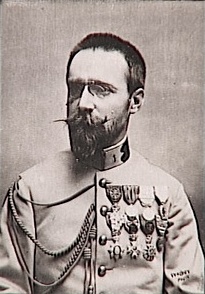
Amédée-François Lamy was a French military officer. He was born at Mougins, in the French département of Alpes-Maritimes on 7 February 1858 and died in the battle of Kousséri on 22 April 1900.

Chad–France relations are the diplomatic relations between the Republic of Chad and the French Republic. France controlled Chad from 1900 until the country's independence in 1960. Both nations are today members of the Francophonie and the United Nations.
Chad is a source and destination country for children subjected to trafficking in persons, specifically conditions of forced labor and forced prostitution. The country's trafficking problem is primarily internal and frequently involves parents entrusting children to relatives or intermediaries in return for promises of education, apprenticeship, goods, or money; selling or bartering children into involuntary domestic servitude or herding is used as a means of survival by families seeking to reduce the number of mouths to feed. Child trafficking victims are primarily subjected to forced labor as herders, domestic servants, agricultural laborers, or beggars. Child cattle herders follow traditional routes for grazing cattle and at times cross ill-defined international borders into Cameroon, the Central African Republic (CAR), and Nigeria. Underage Chadian girls travel to larger towns in search of work, where some are subsequently subjected to prostitution. Some girls are compelled to marry against their will, only to be forced by their husbands into involuntary domestic servitude or agricultural labor. In past reporting periods, traffickers transported children from Cameroon and the CAR to Chad's oil producing regions for commercial sexual exploitation; it is unknown whether this practice persisted in 2009.
Kyari or Khair bin Bukhar al-Kanemi (?-1894) was Shehu of Borno in 1893–1894.

Shehu Umar Sanda ibn Ibrahim Kura al-Kanemi was the Shehu of Borno from 1922 to 1937. He was the son of Shehu Ibrahim Kura of Borno and brother of Shehu Abubakar Garbai.
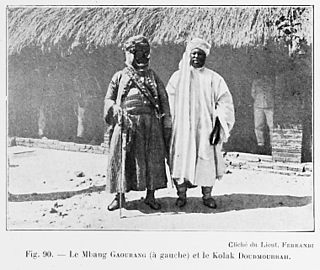
Abd ar-Rahman Gaourang II was Mbang of Bagirmi from 1885 to 1918. He came to power at a time when the sultanate was in terminal decline, subject to both Wadai and Bornu. The Sudanese warlord Rabih az-Zubayr made him his vassal in 1893. Gaourang signed a treaty that made his sultanate a French protectorate in 1897. After the final defeat of Rabih in 1900 he ruled as a subordinate of the French in Chad until his death in 1918.
Al-Zubayr, Al-Zubair, Az-Zubayr or Az-Zubair may refer to:












